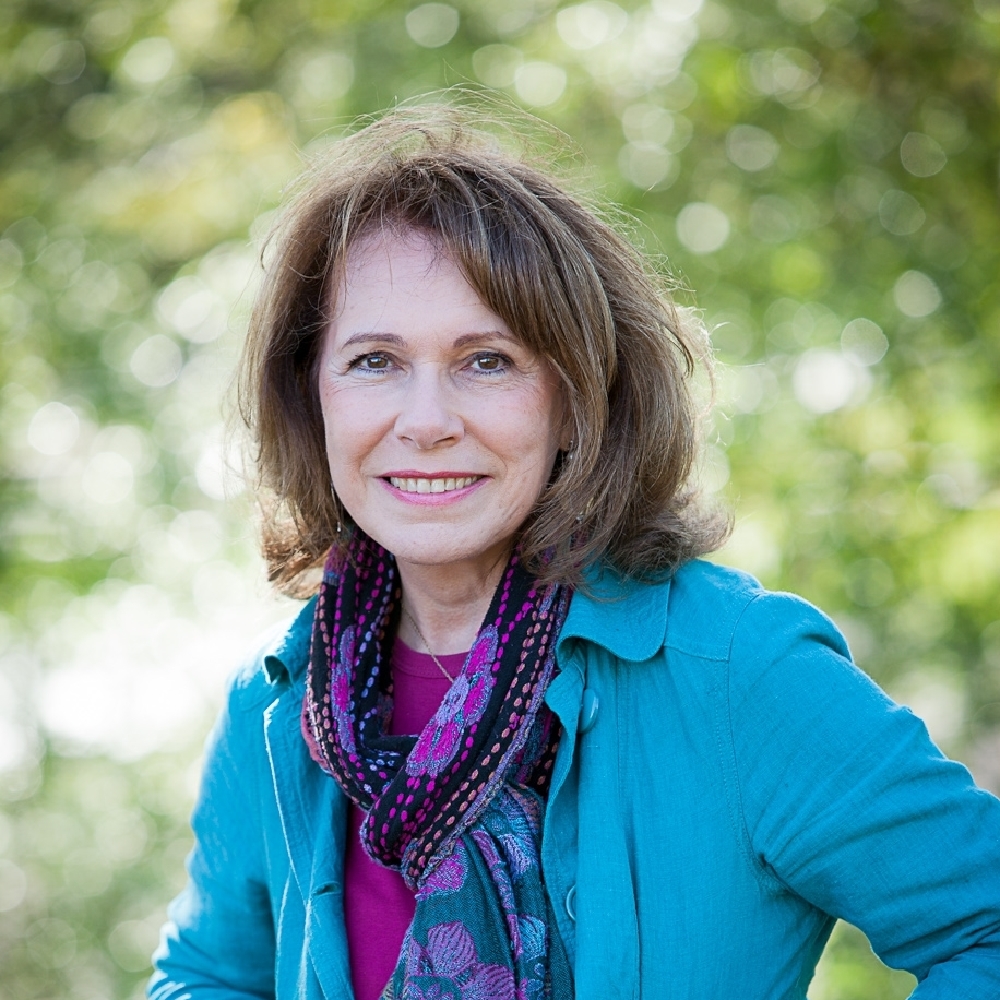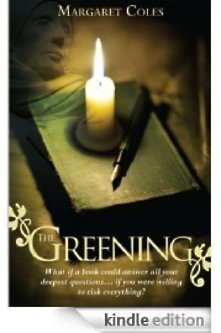
Margaret Coles

The Greening tells the story of Joanna, an ethical Fleet Street journalist who is being put under intense pressure to compromise her principles. She is having a tempestuous affair with a Government minister, a sinister character whom she suspects of manipulating the political events she is reporting.
As the building blocks of her life seem set to tumble around her, Joanna chances upon the journal of the mysterious Anna Leigh. She becomes engaged by Anna’s compelling confessional about her life-changing encounter with the medieval mystic Julian of Norwich, and captivated by Julian, who reminds her of her own neglected ambition to pursue the truth at all costs.
Julian, who was born in 1343, was an extraordinary woman. At the age of thirty, she says, she had a series of visions of the crucifixion, during which she was entrusted with a number of messages. The messages were profound and beautiful, communicating the love of a God who is never angry, who looks upon humanity with pity, not with blame, and who has already forgiven all our wrongdoing, past, present and future.
In Julian’s time – when the Church was preaching hellfire and damnation for wicked sinners – such ideas would have been considered heretical and the punishment for heresy was to be burned at the stake. Julian realised she needed seclusion and secrecy in order to ponder the meaning of the messages. So she became an anchoress, or hermit, living in a room attached to St Julian’s Church, in Norwich, from which she took her name. There she risked discovery and death every day as she wrote her book, The Revelations of Divine Love, which is now a spiritual classic.
Julian’s powerful words challenge Joanna, who realises that she has to make a choice that will affect the rest of her life. But can she believe Julian’s promise that life can have meaning and purpose and that pain and suffering can lead to peace and contentment? Joanna embarks upon a journey that leads her through many adventures, risking everything she holds dear to win the greatest prize of all.
Please tell us about the character of Joanna.
Joanna spent her early childhood in a village in North Wales, where she was free to run wild among the fields, rivers and mountains. Everything suddenly changed when her father, an Army major, was posted to India, and Joanna and her sister Louisa were despatched to live with their Great Aunt Vaughan, on her estate in Shropshire.
Great Aunt Vaughan was a stern taskmaster and Joanna, with her rebellious spirit, soon fell foul of her rules. She had to learn a few things about survival and was blessed to receive the loving guidance of her aunt’s gardener, Michael, who became a surrogate parent.
Joanna had chosen a career in journalism out of a sense of vocation, to uncover lies and reveal the truth. But she has become disillusioned by the dog-eat-dog world in which she works.
As a favourite of the Editor, she has never been required to compromise her principles. Suddenly, though, everything has changed and she is being asked to smear a whistle-blower who has exposed a government scandal in which her lover may be implicated.
Joanna has been with her lover, Patrick, a Cabinet minister, for a year. She was thrilled and flattered to have been chosen by one of the most powerful men in the country and believed his promise that he would leave his wife for her. Recently, though, their relationship has been under strain. As events unfold, Joanna becomes aware that her career and even her life may be at risk.
You are a former Fleet Street journalist, as is the character of Joanna, so how much of your experience has helped to shape the character?
My experience as a Fleet Street journalist has been a very significant influence on the development of Joanna’s character and her story. The world of national newspapers was, and is, a tough environment. As Joanna discovers, there are forces working in the background manipulating events, and it can be very painful, dangerous even, to fall foul of them.
It has been fun to set some of the scenes in the newsroom at Joanna’s paper and to evoke an atmosphere with which I’m very familiar. There is an attraction for journalists, and others, I think, to the high energy, buzzy atmosphere of a newspaper’s newsroom. I have tried to give an insight into that world.
This is your first novel, so was writing it anything like you imagined?
Well, I didn’t set out to write a novel. When I set out to research Julian it was for a play; my fictional work had always been for the theatre. Gradually I came to realise that a novel would be a much better form for the story I wanted to tell, with the contrast of a fictional part, about two modern women, and a non-fictional part, about Julian of Norwich.
I created a loose structure, but my way of working is to allow the characters breathing space, so that the story and characters can grow organically.
It was always uppermost in my mind that I wanted to tell a story that was real and that pulled no punches, an entertaining story that carried the reader along and most definitely was not preachy, one that was life-affirming and gave authentic hope.
How much does a journalistic background aid a writers’ process?
Well it does and it doesn’t! The disciplines of journalism are hugely helpful in training one to get on with it and not faff about (well, not too much anyway!) One also learns not to overwrite and to take a subjective view of what one has written. My first writing teacher, David Mowat, used to say that you have to “kill your babies”; in other words, if it doesn’t serve the narrative of the piece it has to go.
On the other hand, it’s easy to get lost in what David called “the media dust”. I would describe that as being too cerebral, too aware of the necessary discipline and because of that curbing one’s creativity. When I run creative writing workshops or lecture university students the first thing I do is to try to set each person free to express his/her own, unique voice. All the training and technique can come after that.
How much is writing for theatre and writing fiction interchangeable?
In my experience, very much so. I tend to be very visual, so whether I am writing dialogue for a play or for a book I go through the same process. That means that I put myself in the place of the character and try to discover exactly what s/he would say in those particular circumstances - rather than trying to make something up. I walk around the room, being the character, sometimes playing both parts in a conversation. I really do find that works – it does for me, anyway.
Where did your inspiration for the book come from?
It happened by chance – though Julian says that nothing happens by chance. I was in Norwich for a meeting. I had some time to spare before catching the train back to London, so I visited the cathedral. As I left the cathedral my attention was caught by a leaflet in a display near the door. I picked up the leaflet and read about Julian of Norwich, a woman writer and mystic who had lived in the city in the fourteenth century. There was a map, showing the route to her reconstructed cell at St Julian’s Church, which looked to be about a ten-minutes’ walk away. I was curious. I had some time to spare, so I went to take a look.
When I entered the little cell I felt a wonderful, welcoming, loving atmosphere. I sat and meditated for a while – and was filled with a feeling of elation and deep peace. A couple of weeks later a friend invited me to accompany him for a day out in Norwich, where he had meetings. I had never been to Norwich before and here I was going for the second time in two weeks! This time I took the opportunity to research Julian in the resource centre and library next to the church. I returned to London completely hooked, knowing that I must write about this extraordinary woman.
The idea of creating a story with two modern women came later. There is so much in Julian that is beautiful and profound; I felt that the ideal way to include her in a story was to show her gently influencing two women who are doing their best to cope with life as it is today. Incidentally, some experts believe that Julian’s teaching was kept safe over the centuries and intended for our times.
What is next for you?
I have been incredibly lucky with The Greening. It seems to have captured people’s imaginations. I have been interviewed by Jenni Murray on BBC Radio 4’s Woman’s Hour and by Steve Wright, on his Radio 2 show. The publicity has helped to make the book a best-seller in three of Amazon Books’ genres. The Daily Mail and The Daily Telegraph have also been very helpful, giving The Greening excellent reviews.
I am now working on ideas for my next novel. It will again follow a woman’s journey from carefree youth, when everything seems possible, through life’s experiences, joyous and sad, which bring knowledge and wisdom, to a deep understanding of life’s purpose and meaning.
The Greening, by Margaret Coles, is published by Hay House, and is available in paperback (£8.99) and as an e-book.

